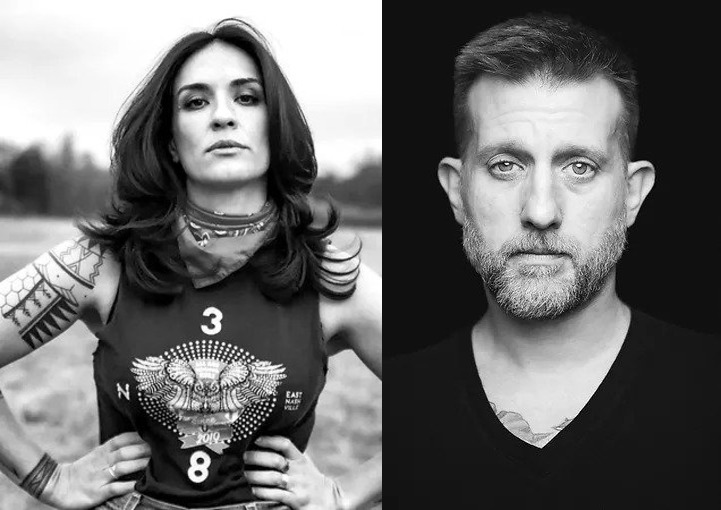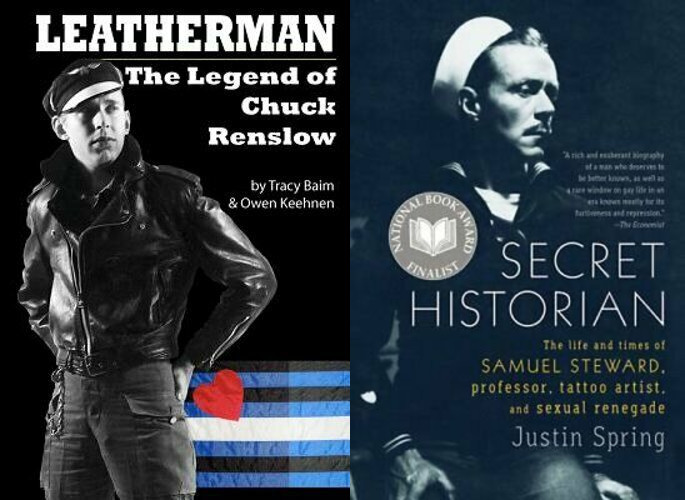Guys and Dolls… and Daddies: Mercy Bell on Her New Leather Musical
By Abel Muñoz

Late last month I sat down to talk with singer-songwriter Mercy Bell and Scott Bradley, a Chicago-based playwright and promoter, about their new musical, Leather Daddies, which is being produced by About Face Theatre and Jonny Stax. Bell and Bradley started collaborating on this musical fairly recently and Stax is still gathering investors to see the project to fruition. We got to talking about the production’s development, it’s historical significance, and the art of applying the Nashville songwriting style to a musical theatre format.
Can you give us a quick overview of the piece and its development?
Scott Bradley: Leather Daddies is the story about a community/family created in 1950s Chicago. I’ve been in Chicago since 2004. I’m really interested in queer history and a lot of my work is steeped in our culture and challenging normativity.
I was approached by a fellow Chicago playwright, Philip Dawkins, who turned me on to this biography called Leatherman: the legend of Chuck Renslow by Tracy Baim and Owen Keehnan. And I had just finished reading Justin Spring’s biography, Secret History: The Life and Times of Samuel Steward, Professor, Tattoo Artist and Sexual Renegade, where I was introduced to Chuck Renslow and Domingo “Dom” Orejudos through their interaction with Sam Steward.
Dawkins had been talking with Baim and Keehan about adapting their book for the stage. And he asked me if I might be interested. I gobbled up the biography and I recognized the connections to my interests and passion for queer history in Chicago. So, I jumped on board. But when I looked at the material and looked at their lives, I didn’t see a play.
I felt a play would either be too pornographic to portray the sort of sexual boundaries they were pushing, or it would have to be cleaned up. And we couldn’t do that.

I came out of doing musical theater work. And the type of musical theater work I was doing had contained a lot of rock and roll. This material needs to be a rock show. Dance and the music could be a way to express the sex and passion.
And so that’s what began the journey for me. I knew I wanted a collaborator to share the lyrical writing responsibilities with, and I also wanted find a composer. I identify as white, and I wasn’t going to do this project unless my partner was Filipino like Dom, one of the musical’s primary characters.
After about a year and a half of searching for that person, I found Mercy Bell who identifies as Filipina and queer.
What did you think about all of this, Mercy?
Mercy Bell: I immediately said yes! In the back of my mind, when people would ask me what I wanted to do with my life, I’ve always thought that I’d love to research history and write a musical, because I really love musicals. But nobody’s ever going to ask me to do that. So, when Scott contacted me, I thought it was a joke. But then I thought I’m gonna do it anyway… because what else did I have to do?
And then I started talking to him and Jonny Stax, one of the producers, and I realized, oh, this is very legit. I wanted to do it immediately. If you’d ask 12-year-old Mercy, what her dream job would be, it would be this. The first musical I ever wrote was when I was 10, and it was a historical musical about the civil war. I never finished it.

Let’s discuss the sources you’re using to develop the content.
SB: Fortunately, the central people in the musical have their stories well documented, particularly beginning in the eighties. A lot of the people like Chuck, Dom, and Sam were able to come out of the shadows and reveal themselves beyond their pseudonyms. They talked about who they were and how they had been part of that Pre-Stonewall era. We did a residency at Leather Archives in Chicago where we wrote the first four songs together.
Why did you decide to write a musical and not a play?
SB: I felt like making a biographical drama with these people and these lives wouldn’t do them justice. They were such rebels. They lived in the bars. The jukebox was constantly going on in the bathhouses. And there was the dancing, and the fucking, and the motorcycles. And I mean, all that was part of that culture. They were really in your face. They were being asked to leave the gay bars where they were meeting, because it was scaring away the other gay men when they would walk in with their leather jackets. It was the fifties.
MB: In musicals, you can tell multiple stories at once in a way unlike a play. Because each song takes you on a journey.
SB: It takes you internally. So, structurally speaking, musicals tend to have simple plots because you’re going vertically into the characters as opposed to covering a span of things. Each song is mini monologue, interior monologue. You don’t get that in regular plays that are dialogue based.
MB: One element of this musical is the rock and roll. I am using this term loosely. In this musical, we’re exploring the early stages of this genre and we are also exploring the early stages of sexual liberation. Rock and roll has the ability to evoke a sexuality and sensuality without taking your clothes off.
SB: When we look historically at these lives, they were underground. In the music, I can have characters say the things that would’ve gotten them arrested at that time. These characters are complex and often dealing with their own conflicted feelings. For example, Dom is Filipino and Italian, but he struggles with that identity. He also struggles with his identity as a queer person. He was getting Emmy awards for his choreography, and yet no one in the leather community knew he was a ballerina because it wasn’t the masculine thing. In the leather scene, they only knew him as this erotic artist. There are these multiple closets people were living in in order to be safe.
MB: One way we try to capture this conflict is by playing with a lot of innuendos, at least lyrically.
Just to be clear, this musical takes place in the pre-Stonewall era.
MB: We’re specifically looking at the years of 1959 through1965. That was the era that Sam introduced BDSM and tattooing to Chuck and Dom. Sam was in love with Chuck, but Chuck was in love with Dom and Dom was just kind of… being Dom. It was a love triangle of sorts. I guess Sam was an influencer, even though I hate that word. But Sam is the person who brings tattooing and BDSM to these guys. Then they transform it into something popular and approachable. As much as they can. Sam is this interesting character who’s older than Dom and Chuck and functions like a mentor to them in many ways.
Why do you think this work is important today?
SB: I began working on this in 2019 and the administration in the White House was fanning the flames of hate. These men, Chuck, Dom and Sam, were defying the status quo and really building a community for themselves and for queers. They were responsible for helping push the boundaries in a time of stifling censorship. And that felt like it had parallels with the world that I was living in.
I think it’s important that we look at our forbearers and recognize their resilience and our own. Our queer community is built on our strength and inventiveness. It feels important to say, “Hey, we’ve been here before, and we need to come together and fight.”
MB: Even though this is a queer story, I want everybody to be able to be freer. I want them to come out of their closets. I want them to defy their labels. I think this is a story about so much defiance, and I want people to feel free to be themselves across the board. We put ourselves in closets. We must free ourselves from these self-imposed closets and that’s the only way we can make it better for everybody. And that’s why I’m doing this project.
Since you two come from very different backgrounds, artistically, what challenges have you had to overcome?
SB: I knew that Mercy came from a theater background but has been writing pop and folk music. We had to learn how to share the same lexicon.
MB: For me, it’s interesting to write with this much preparation. Anybody who’s familiar with Nashville songwriting knows that it’s normal for songwriters to do a co-write every single day and pound out 10 songs in a week. I feel like I have a lot of time to write this even though from I’ve what I’ve heard, musicals tend to take a long time.
SB: And I’m just the opposite. I’m so used to working with composers and working on songs for a while. Mercy brings a different sense of musicality with her. She’s like “Let’s play around on this thing.”
MB: This musical has been written in a collaborative, Nashville songwriting style, which is very specific. I’m not gonna ever pretend to know anything about musical composition from a theatrical tradition, but I do know about songwriting in the Nashville style, where the collaboration extends beyond the writing: you choose a musician and then you trust them. You trust that they’re gonna bring something to the team. It almost feels like improv. This is my team. I know what they can bring to it. This allows the musicians to express themselves. One of my favorite things about making music in Nashville is that when you do find these people who are so talented and they know what they’re doing, the process allows them to have their little voice in there.
At the end of April, Bell and Bradley rounded up multiple queer musicians (Ellen Angelico, Tiffany Minton, Mike Maimone, and Carrie Schneider) to record a forthcoming EP of four songs from Leather Daddies, produced by Alex Caress. To learn more about the the project and support it’s creation, please visit: https://www.jonnystax.com/leatherdaddies, and click HERE to watch a clip of one of the new songs.
Abel Muñoz (He/Him/His) is originally from Texas and now lives in Nashville. He is passionate about art, but most days he can be found working at a sexual health clinic. He loves 90s country music, especially Linda Ronstadt and George Strait. His ramblings and adventures can be found on various social media platforms (Twitter: @artofspectator, IG: @artofthespectator).